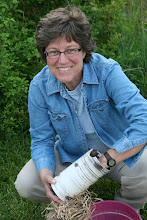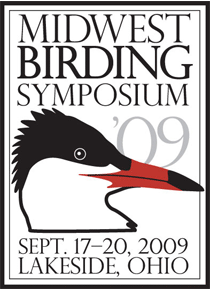Misty Morning Birding, Teardrop in My Eye
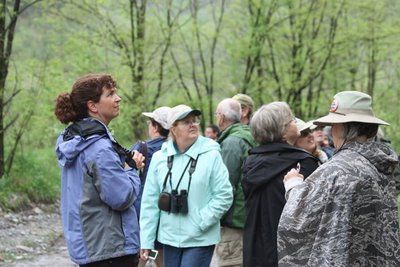 It usually rains at the end of April and beginning of May in West Virginia. When I was corresponding with other members of the nature blogging Flock about the trip, I advised raingear, lots of it. And this turned out to be a very wet festival.
It usually rains at the end of April and beginning of May in West Virginia. When I was corresponding with other members of the nature blogging Flock about the trip, I advised raingear, lots of it. And this turned out to be a very wet festival.Which was something to deal with, but not a problem. People who love warblers are happy folks. They kept their sunny attitude.
The flowers were still lovely. Golden ragwort and cranesbill (wild geranium).
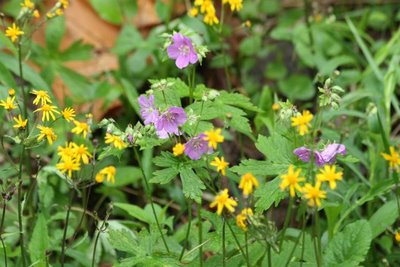 The magnificent large tree, Fraser magnolia, Magnolia fraseri.
The magnificent large tree, Fraser magnolia, Magnolia fraseri.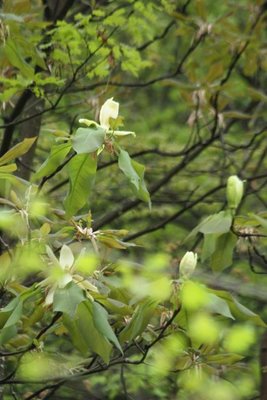 The birds' colors were a bit compromised by the fog and rain. In sunlight, cerulean warblers are sky blue.
The birds' colors were a bit compromised by the fog and rain. In sunlight, cerulean warblers are sky blue.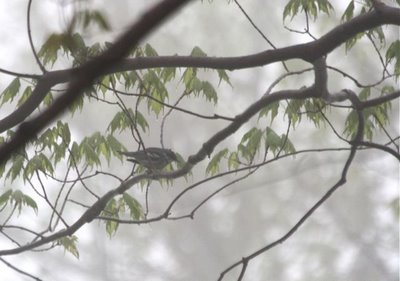
They still sang, if a little less persistently. Their black necklaces were all that distinguished them; their stunning blue backs would have to wait for better light, better days.
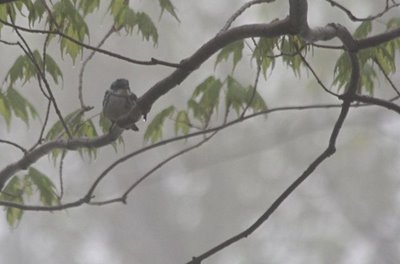
It was all very ricepaper and watercolor, very Japanese. Even a male scarlet tanager looked grayish in this light.
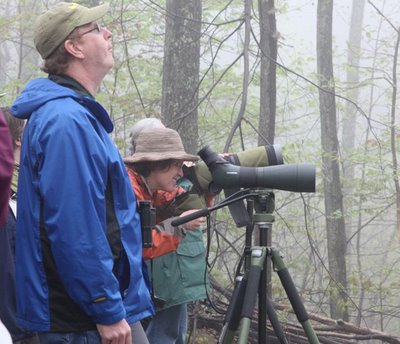 Well, it's shaped like a tanager... Photo by Nina.
Well, it's shaped like a tanager... Photo by Nina.The direction of light became paramount in getting a decent look at a bird. This northern parula cooperated for a nanosecond, showing his sunny breast.
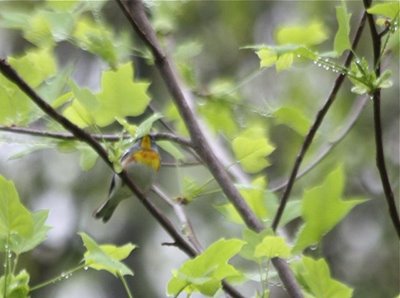 As we walked, I noticed a female eastern towhee as she burst frantically from the ground. She appeared to have been trying to stay still, then lost her nerve. I knew that meant she was on eggs somewhere nearby. I split from the group and walked carefully along the foot of the bank.
As we walked, I noticed a female eastern towhee as she burst frantically from the ground. She appeared to have been trying to stay still, then lost her nerve. I knew that meant she was on eggs somewhere nearby. I split from the group and walked carefully along the foot of the bank.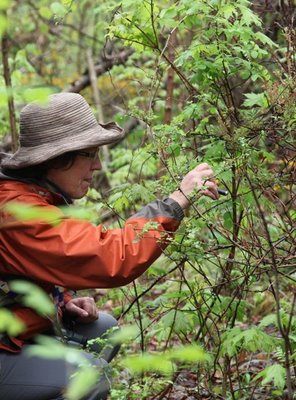 And found the nest, using a laser pointer to show it to the festival participants. Photo by Nina.
And found the nest, using a laser pointer to show it to the festival participants. Photo by Nina.Four white eggs, speckled with rust, well hidden in a grassy nest tucked into the bank, under a big multiflora rose. I wish her well.
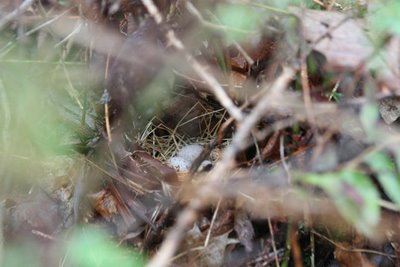
Some black rat snake eggs were less fortunate. Examining these, I decided that they had been washed out after having been buried by the female snake last summer. The eggshells were unpunctured, but there was nothing inside. So it wasn't a predation event--it was a dessication event.
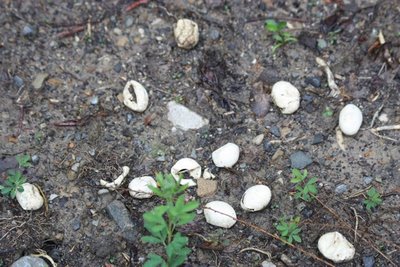
Red efts (the wandering, terrestrial, juvenile form of the red-spotted newt) were easier subjects than birds.
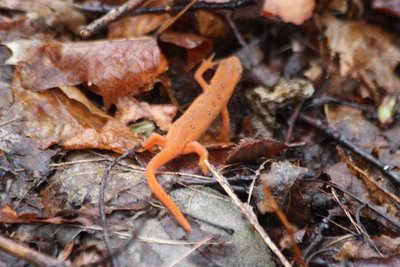 The smallest red eft I'd ever seen enchanted Nina. I'm sure he'll make an appearance on her blog, Nature Remains.
The smallest red eft I'd ever seen enchanted Nina. I'm sure he'll make an appearance on her blog, Nature Remains.Katdoc joined her in the photoquest. Katdoc is geared out, full birding plumage.
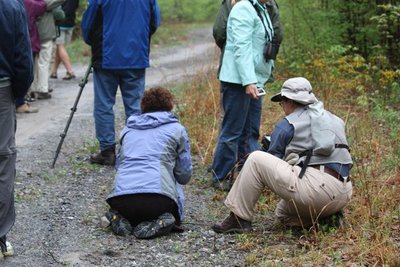 Nina has ferocious focus.
Nina has ferocious focus.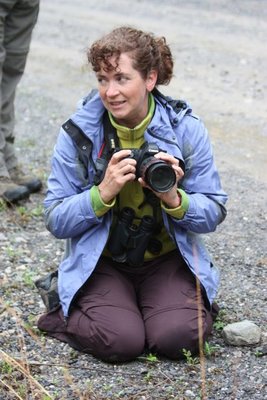 She folded up like a tripod and became one with the newt.
She folded up like a tripod and became one with the newt.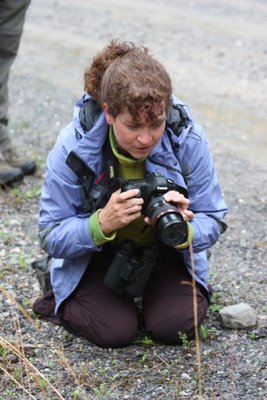
One of Nina's many gifts is looking very closely, and waiting.
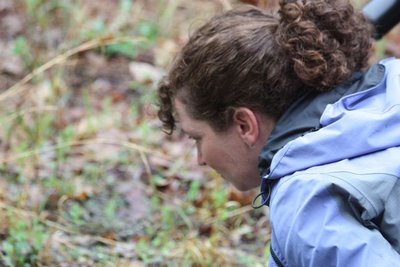
Everyone moved on, which is just what Nina needed.
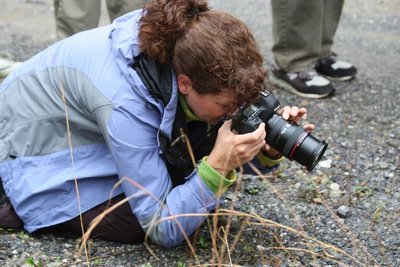 And she became a rock in the road, and captured the eft without touching it.
And she became a rock in the road, and captured the eft without touching it.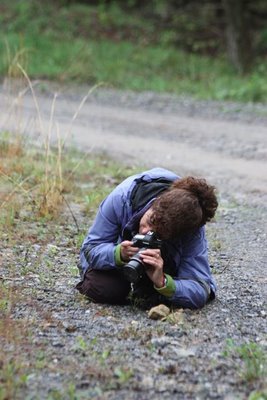
As Nina and I walked the last bit of Spruce Run Road, loosely known at the festival as Muddlety, we marveled at the abundant life all around us--prairie and blue-winged warblers, chat after yellow-breasted chat, redstarts and hooded warblers, the federally threatened cerulean warbler, scarlet tanagers, and everywhere the flutes of wood thrushes. A tear coursed down Nina's cheek, then another. We had both seen the coal company permit sign about halfway up the road, that, to those who know its significance, means that this entire woodland--all this habitat, all this mountain--is about to be blown up, never to be woodland habitat again.
When you flip a light switch on, there's a 50 percent chance that the energy you're using comes out of what used to be a mountain in West Virginia. Blowing up the richest and most diverse forest in the US--leveling these mountains-- to get the coal underneath it is not a sustainable way to get energy. It is insanity itself. It buries the streams, chokes the rivers and poisons the people. Please, please watch this five-minute video. Maria Gunnoe says it so much better than I ever could. And if you're moved to action, go to the Ohio Valley Environmental Coalition web site and see what you can do to stop this abomination. Muddlety probably won't survive, but there are so many more equally beautiful mountains--and communities, streams, rivers and lives-- the coal companies are planning to destroy.
Watch, then go. Keep spending your ecotourism dollars in West Virginia. All profits from the New River Birding Festival go to environmental education in local schools--a slow but, we hope, ultimately effective way to shout STOP THIS MADNESS!! Thank you.
And thank you, Cassandra.
Labels: Maria Gunnoe, mountaintop removal mining, Nature Remains, New River Birding Festival, Nina, Ohio Valley Environmental Coalition, red eft, West Virginia

